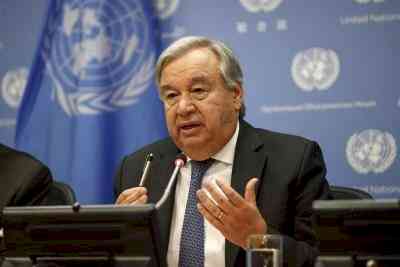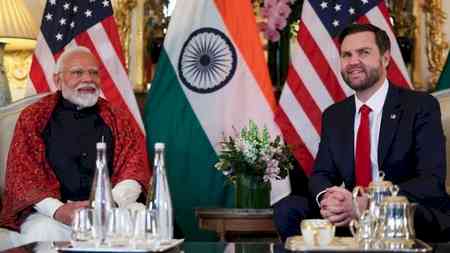Delhi G20 Summit an opportunity to start reform of global financial system: Guterres
UN Secretary-General Antonio Guterres has denounced the international financial system as a relic of the colonial past and said that the G20 Summit in India offers an opportunity to start moving on reforming it.

United Nations, July 13 (IANS) UN Secretary-General Antonio Guterres has denounced the international financial system as a relic of the colonial past and said that the G20 Summit in India offers an opportunity to start moving on reforming it.
The debt crisis faced by 40 per cent of the developing countries is because of the “inequality built into our outdated global financial system, which reflects the colonial power dynamics of the era when it was created," Guterres said here on Wednesday.
He referred to the recent international initiatives on dealing with the crisis and said, “The upcoming G20 Summit is an opportunity to take these ideas forward."
The summit in September in New Delhi, the G20, which is made up of industrialised and major emerging economies will be presided over by Prime Minister Narendra Modi.
Setting the tone ahead of the summit at a meeting of the G20 Finance Ministers earlier this year, Modi called urged action to reform the international financial institutions asserting that trust in them was eroding.
Even though India itself is not facing a debt crisis, it has taken up the cause of countries affected by it during its leadership of the G20 and was reported to be preparing a proposal in the context of the group to help the countries facing the worst debt crisis by taking drastic actions, including lenders, taking "haircuts" or forgiving substantial portions of the loans.
The main international financial institutions were created in the aftermath of World War 2.
Guterres, who was speaking at the release of the report on the international debt problem by the UN Global Crisis Response Group (GCRG), said, “Half our world is sinking into a development disaster, fuelled by a crushing debt crisis."
The markets may not be feeling the impact of the crisis “because most of these unsustainable debts are concentrated in poor countries (and) they are not judged to pose a systemic risk to the global financial system,” he added.
But that is a "mirage" and even if markets aren't, the 3.3 billion people are, Guterres said.
According to GCRG data, India's public debt last year stood at $3 trillion and of this, the borrowing from foreign sources was $205 billion.
The public debt amounted to 83.1 per cent of India's GDP and the interest payments were 27 per cent of the revenue, the data said.
The public debt load for each Indian was $2,000, of which $147 was from external debts, it added.
Explaining how the debt burden affects the development programmes of countries, the GCRG showed that the burden of interest payments for India was 1.2 times what the country spent on education and 5.2 times what it spent on health.
Highlighting the inequalities in the global financial system, the GCRG report said that developing countries have to pay much higher interest rates compared to developed countries.
Rebecca Grynspan, the coordinator of the GCRG, said that credit rating agencies made the problems worse for developing countries that receive lower ratings, which translate to higher interest rates.
Without reference to the fundamental indicators of the economies, credit rating agencies are "punishing" developing countries, said Grynspan, who is also the Secretary-General of the UN Conference on Trade and Development (UNCTAD).
Asked about what can be done by the G20 to help deal with the crisis, she suggested increasing the capitalisation of the IMF and the World Bank (WB).
She noted that the size of the WB's capital was now one-fifth of what it was in 1960 in relation to the size of the global GDP.
Asked about the need for debts for development and the risk of their non-productive use, Grynspan said that to make up for their lack of capital, countries have to incur debts for the investments they need.
"When the debt is well used to expand the productive capacity of the countries, the infrastructure, and the basic needs of its people," she said, and it "has a very high return".
"The problem is, when you have done that, and suddenly that (interest rate) has become much more expensive and so you are no longer in a sustainable path because you have to dedicate a lot of your revenues inside the country or the revenues from export to pay your debt," she added.
But "if it is ill-used, you can be in trouble," she said, adding that it was not the case for most countries and they "are in trouble because of systemic shocks, not because of the of the country's individual decisions".
"The Covid pandemic, climate change and the cost-of-living crisis have put a very heavy burden on the sustainability of the debt of the developing countries," she said.
The conditions for the loans also matter and the private sector is reluctant to finance loans for development that require long periods, according to her.
"And that's why we are insisting that the development banks have to be recapitalised and they have to use the resources to scale up the support for developing countries," she added.
(Arul Louis can be contacted at [email protected] and followed at @arulouis)


 IANS
IANS 










